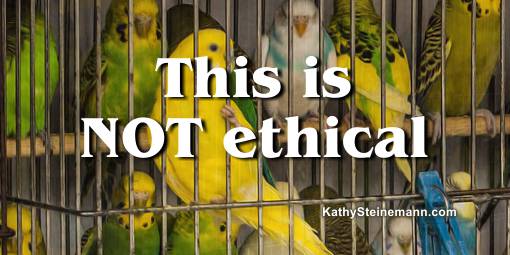
What is an oxymoron?
“Oxy” implies sharpness, keenness, acidity. The “moron” part, considered politically incorrect, seems appropriate for the purposes of this article.
Oxymoron: a figure of speech in which contradictory terms appear in conjunction.
Here are some examples:
Eloquent silence
Humane slaughter
Idiot savant
Living dead
Loud whisper
Working vacation
In each case, the first word is a contradiction of the second.
“Ethical bird breeder” is perhaps one of the cruelest oxymorons in existence.
I browsed parrot pages on the Internet a few days ago and encountered many sites run by “ethical” bird breeders. They described themselves with statements such as the following:
We provide premium, tender-loving care. All babies are hand-fed.
The emotional and physical needs of our birds are our top priority.
Our parrots are trained to basic commands.
We offer financing up to five years.
Let’s consider those statements, one by one.
We provide premium, tender-loving care. All babies are hand-fed.
Fledglings are whipped away from the parent birds as soon as they hatch, allowing no interaction with the beings who gave them life. Even worse, eggs are sometimes incubated so that the mother will produce more eggs. The babies are fed mash mixed by the parrot breeder, supposedly from the finest of ingredients. However, it’s still mash without some of the valuable enzymes, bacteria, and other beneficial components of partially digested food that parent birds feed to their offspring. Sometimes the mash will be too hot or too cold. Some breeders use gavage—which entails forcing a tube down the esophagus and into the fledgling’s crop. Without the right touch, baby birds can be killed by gavage or syringe hand-feeding.
Is this tender-loving care?
Fledglings and parent birds are denied what is built into their telos—the desire for a familial relationship that in the wild can exist for an extended period of time. Some breeds of parrots actually name their babies and call to them in times of danger.
The emotional and physical needs of our birds are our top priority.
Birds are flock animals. Their emotional and physical needs include bonding with their kind and the desire for touch contact—like being held under a wing or preening. They coo when they feel safe or shriek warnings when they perceive danger.
However, in a captive environment they yearn to fly. Their natural instinct to forage never has a chance to develop. In the wild, they may mate for life. In human environs, they might spend their entire lives in an emotionally stunted, one-bird home.
Although breeders might claim optimum conditions for their birds, their merchandise—because that’s what the birds are—often live in dimly lit, cramped cages that are caked with feces and bacteria-ridden water bowls or bottles that haven’t been cleaned properly or often enough. They might be fed a substandard diet consisting of only pellets or seeds, with no access to fresh fruit and vegetables.
Our parrots are trained to basic commands.
Sure, they’re trained like servants. To obey the commands of their masters. From the moment they open their eyes, they’re taught that they are property. They aren’t allowed to show disobedience. Unlike a five-year-old child who can throw a series of temper tantrums and be thought of as “naughty” or “cute”, a parrot who tries the same thing might be branded as untrainable and could end up locked in a cage in the basement.
We offer financing up to five years.
Parrots are property. In most places, that’s confirmed by laws and statutes. They’re saleable, financeable, depreciable property.
Need I say more?
It all boils down to one thing: money.
“Ethical” breeders breed birds to earn money. Every bird they sell fattens their wallet at the expense of another piteous creature who will likely be rehomed multiple times—before an untimely death, imprisoned by humans who are interested in their own needs, not the needs of the animal they have enslaved.
Don’t buy from a breeder, no matter how “ethical” they claim to be.
If you can provide an optimum environment for a companion parrot, please contact a bird rescue and offer to steward or adopt one or more of their charges. No bird deserves to be bred for a lifetime of miserable subjugation.
The Writer’s Lexicon series
and additional resources on my Facebook page.
Discover more from KathySteinemann.com: Free Resources for Writers
Subscribe to get the latest posts sent to your email.
